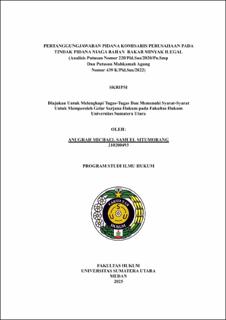Pertanggungjawaban Pidana Komisaris Perusahaan pada Tindak Pidana Niaga Bahan Bakar Minyak Ilegal (Analisis Putusan Nomor 220/Pid.Sus/2020/Pn.Smp dan Putusan Mahkamah Agung Nomor 439 K/Pid.Sus/2022)
Criminal Liability of A Company Commissioner in The Crime of Illegal Fuel Oil Trading (Analysis Of Decision Number 220/Pid.Sus/2020/Pn.Smp and Supreme Court Decision Number 439 K/Pid.Sus/2022)

Date
2025Author
Situmorang, Anugrah Michael Samuel
Advisor(s)
Nurmalawaty
Lubis, Rafiqoh
Metadata
Show full item recordAbstract
The crime of illegal Fuel Oil trading is an offense with significant detrimental impacts, often committed through corporations, which raises a legal problematic concerning the subject who must be held accountable. Legal ambiguity and differing judicial interpretations concerning the criminal liability of a Company Commissioner have become a crucial issue, as reflected in the Sumenep District Court Decision Number 220/Pid.Sus/2020/Pn.Smp, which acquitted the defendant, in contrast to the Supreme Court Decision Number 439 K/Pid.Sus/2022, which convicted him. This research aims to analyze the legal framework, the construction of a commissioner's criminal liability, and the judicial reasoning within these two court decisions. The research method employed is normative juridical, utilizing a statute approach and a case approach. The research findings indicate that the Sumenep District Court decision incorrectly applied a rigid separation of liability between the individual and the business entity, releasing the defendant from all charges (onslag van alle rechtsvervolging) on the grounds that the act was committed on behalf of the corporation, thereby deeming the element of unlawfulness to be absent in the defendant as an individual. Conversely, the Supreme Court made an appropriate legal correction by overturning the said decision and declaring the defendant guilty. The Supreme Court affirmed that acting on behalf of a corporation does not automatically eliminate the personal criminal liability of its management. The defendant's liability as a commissioner was established based on his active and functional role in the illegal operational activities, a role that exceeded his purely supervisory duties. This Supreme Court ruling affirms that the criminal liability of corporate management is determined by the individual's actual function and actions within the structure of the crime, not merely by their formal title
Collections
- Undergraduate Theses [3144]
